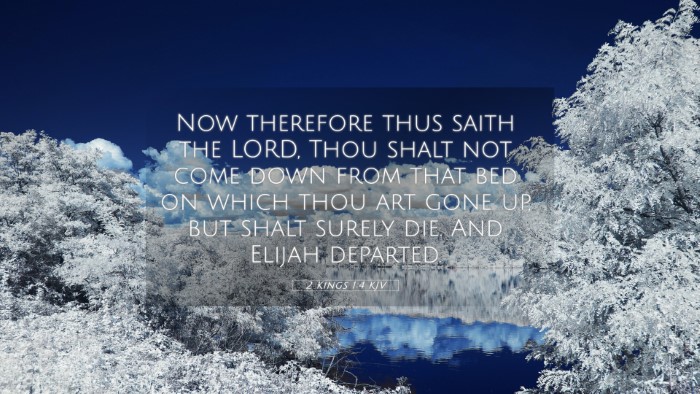Old Testament
Genesis Exodus Leviticus Numbers Deuteronomy Joshua Judges Ruth 1 Samuel 2 Samuel 1 Kings 2 Kings 1 Chronicles 2 Chronicles Ezra Nehemiah Esther Job Psalms Proverbs Ecclesiastes Song of Solomon Isaiah Jeremiah Lamentations Ezekiel Daniel Hosea Joel Amos Obadiah Jonah Micah Nahum Habakkuk Zephaniah Haggai Zechariah Malachi2 Kings 1:4 Similar Verses
2 Kings 1:4 Cross References
Now therefore thus saith the LORD, Thou shalt not come down from that bed on which thou art gone up, but shalt surely die. And Elijah departed.
Uncover the Rich Themes and Topics of This Bible Verse
Listed below are the Bible themes associated with 2 Kings 1:4. We invite you to explore each theme to gain deeper insights into the Scriptures.
2 Kings 1:4 Cross Reference Verses
This section features a detailed cross-reference designed to enrich your understanding of the Scriptures. Below, you will find carefully selected verses that echo the themes and teachings related to 2 Kings 1:4 KJV. Click on any image to explore detailed analyses of related Bible verses and uncover deeper theological insights.

2 Kings 1:16 (KJV) »
And he said unto him, Thus saith the LORD, Forasmuch as thou hast sent messengers to enquire of Baalzebub the god of Ekron, is it not because there is no God in Israel to enquire of his word? therefore thou shalt not come down off that bed on which thou art gone up, but shalt surely die.
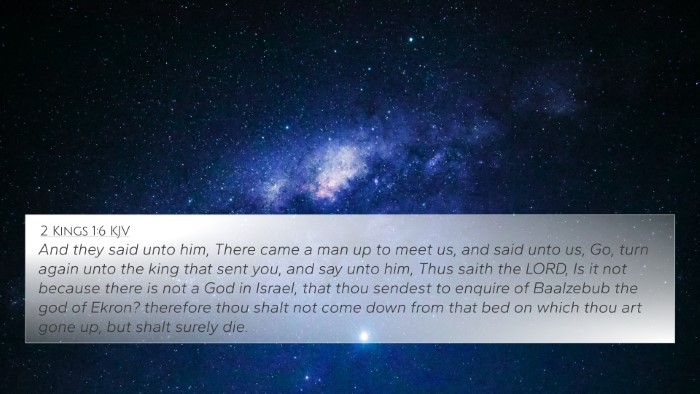
2 Kings 1:6 (KJV) »
And they said unto him, There came a man up to meet us, and said unto us, Go, turn again unto the king that sent you, and say unto him, Thus saith the LORD, Is it not because there is not a God in Israel, that thou sendest to enquire of Baalzebub the god of Ekron? therefore thou shalt not come down from that bed on which thou art gone up, but shalt surely die.

Proverbs 11:19 (KJV) »
As righteousness tendeth to life: so he that pursueth evil pursueth it to his own death.

Proverbs 14:32 (KJV) »
The wicked is driven away in his wickedness: but the righteous hath hope in his death.
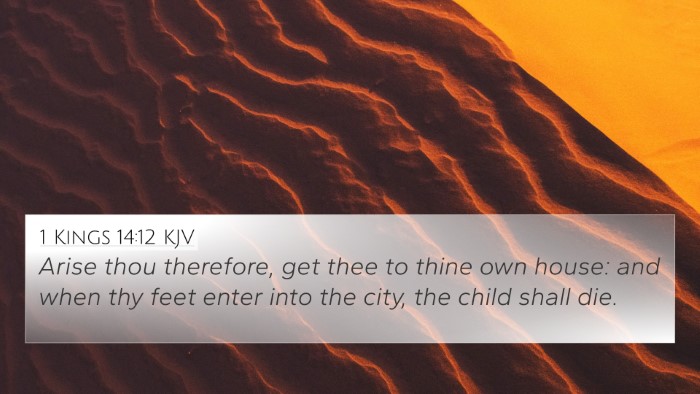
1 Kings 14:12 (KJV) »
Arise thou therefore, get thee to thine own house: and when thy feet enter into the city, the child shall die.
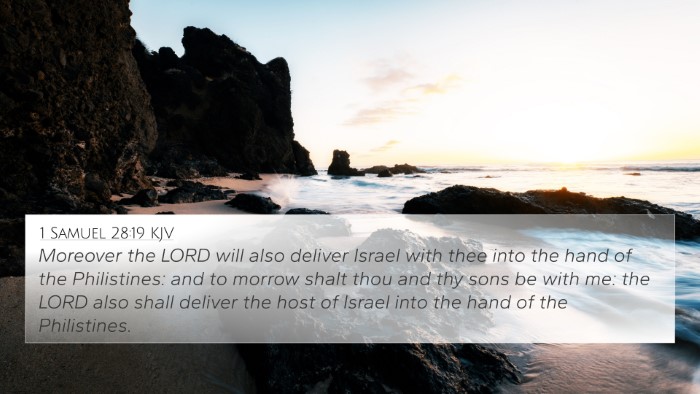
1 Samuel 28:19 (KJV) »
Moreover the LORD will also deliver Israel with thee into the hand of the Philistines: and to morrow shalt thou and thy sons be with me: the LORD also shall deliver the host of Israel into the hand of the Philistines.
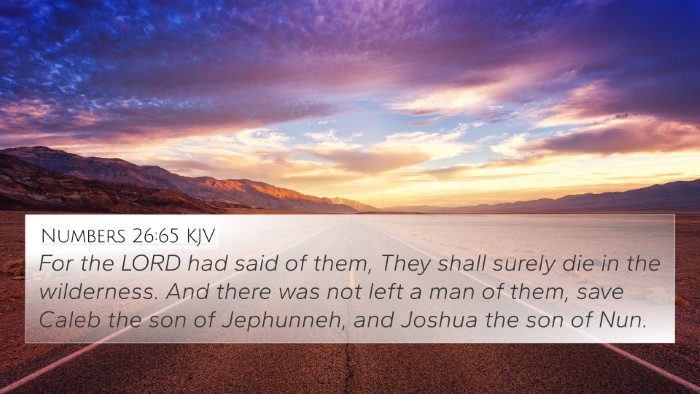
Numbers 26:65 (KJV) »
For the LORD had said of them, They shall surely die in the wilderness. And there was not left a man of them, save Caleb the son of Jephunneh, and Joshua the son of Nun.
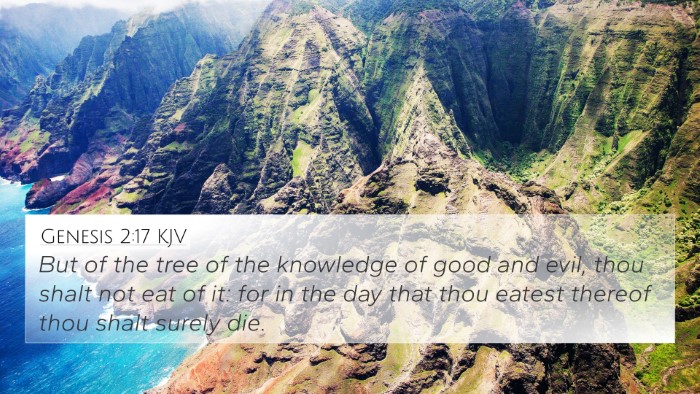
Genesis 2:17 (KJV) »
But of the tree of the knowledge of good and evil, thou shalt not eat of it: for in the day that thou eatest thereof thou shalt surely die.
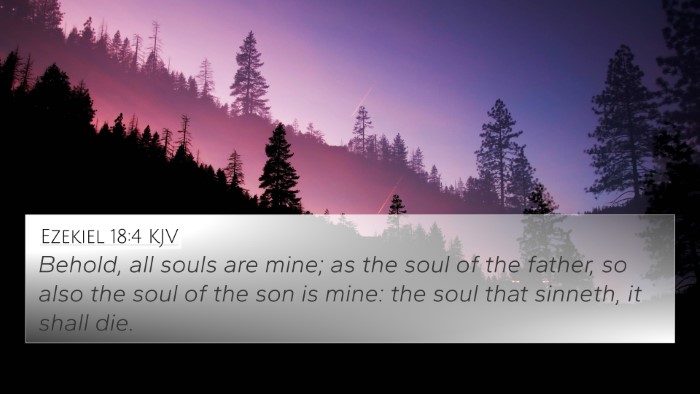
Ezekiel 18:4 (KJV) »
Behold, all souls are mine; as the soul of the father, so also the soul of the son is mine: the soul that sinneth, it shall die.
2 Kings 1:4 Verse Analysis and Similar Verses
Understanding 2 Kings 1:4
The Bible verse 2 Kings 1:4 states:
"Now therefore thus says the Lord: You shall not come down from the bed to which you have gone up, but you shall surely die. So Elijah departed."
Verse Meaning and Scriptural Context
This powerful statement comes from a moment of divine revelation delivered through the prophet Elijah during a time of great turmoil in Israel. The verse illustrates the seriousness of the message God sent to King Ahaziah, who had turned away from the Lord.
Key Themes in 2 Kings 1:4
- Divine Judgment: The verse encapsulates the inevitable consequence of Ahaziah's choices.
- Prophetic Authority: Elijah's role as a messenger of God underscores the weight of prophetic words.
- Unrighteous Leadership: Ahaziah's actions reflect the broader theme of Israel's leaders abandoning God.
Commentary Insights
Several respected commentators have provided their interpretations on this verse:
- Matthew Henry: He emphasizes that the message was both a warning and a condemnation, showing God's disapproval of Ahaziah's idolatry and disbelief. He remarks on Elijah's unflinching delivery of God's message, which serves as a reminder of the potency and seriousness of divine communication.
- Albert Barnes: Barnes expands on the implications of the verse in relation to Ahaziah's actions, detailing how the king sought counsel from Baal instead of seeking the Lord. His analysis highlights the contrast between human wisdom and divine will.
- Adam Clarke: Clarke notes the significance of the command given to Elijah, emphasizing that the fate of Ahaziah was sealed the moment he turned away from God. Clarke’s commentary provides insight into the theology of divine judgment and the prophetic role in warning the people of their impending doom.
Cross-References and Thematic Connections
2 Kings 1:4 connects with several other scripture passages, forming a broader narrative about God’s authority, judgment, and the responsibilities of leadership:
- 1 Kings 18:17-18: This passage describes Elijah confronting King Ahab about Israel's sin, establishing a pattern of prophetic warnings.
- 2 Kings 1:6: It further recounts how this message of judgment is affirmed by divine signs.
- Isaiah 31:1: This verse warns against trusting in worldly powers, echoing the theme of turning away from God for help.
- Lamentations 3:34-36: These verses reflect on God’s justice, reinforcing that He does not overlook wrongs.
- James 5:17-18: Here, Elijah is referenced in the New Testament, emphasizing his earnest prayer and the powerful impact of a righteous person's supplication.
- 1 Samuel 15:23: This highlights the consequences of disobedience to God, where rebellion is likened to witchcraft.
- John 3:36: It speaks about the consequences of rejecting God’s word, paralleling the fate of Ahaziah.
Conclusion
2 Kings 1:4 is a profound reminder of the weight of divine messages and the outcomes of unrighteous choices. Through the lenses of various commentaries, we can grasp the seriousness of turning away from God and the importance of heeding His word. Cross-referencing this verse with others enhances our understanding and reveals the thematic connections woven throughout the Biblical text.
Cross-Referencing Biblical Texts
Engaging in cross-referencing and thematic analysis can deepen your study of the Bible. For tools and resources, consider exploring:
- A comprehensive Bible concordance to identify themes.
- Use a Bible cross-reference guide for navigating related verses.
- Participate in cross-reference Bible study sessions for collaborative insights.
- Learn how to use Bible cross-references effectively in your personal study.

